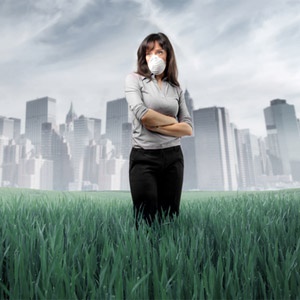
Women who live in areas with higher air pollution may also have higher anxiety, according to a new analysis.
Related to mental health
"It's a really interesting finding and definitely suggests that air pollution may be related to mental health," said lead author Melinda C. Power of Johns Hopkins University in Baltimore.
"If this is truly causal this is going to have a huge effect on the population because everyone is exposed, but we need more research to build this body of evidence," Power added.
The researchers used data on more than 70,000 women in the Nurses' Health Study who filled out an eight-question anxiety survey between ages 57 and 85.
Read: Generalised anxiety disorder
Overall, about 15 percent of the women had high anxiety symptoms.
Using their previous home addresses from before they filled out the anxiety questionnaire, the researchers were able to estimate the women's exposure to so-called particulate matter in the air during the past 15 years, based on factors like distance to major roadways, population density, local sources of emissions and wind speeds.
The researchers found no link between anxiety levels and large air pollution particles, but exposure to fine particles was tied to increasing anxiety levels, according to results in BMJ. The more recent the exposure, the higher the level of anxiety tended to be.
Small air particles
For example, women who were exposed to the most small particles in the air one month before their anxiety test were about 12 percent more likely to have high anxiety symptoms, compared to those estimated to be exposed to the least particles one month previously.
Fine particulates come from combustion sources, including cars and power plants, Power told Reuters Health by phone. The smaller the particle, the deeper it may travel into the lungs.
"Our study can only comment on the population level, on average people who were more highly exposed had a higher level of anxiety," she said. It did not assess distance to pollution sources or the amount of air pollution an individual would need to experience to have increased anxiety.
Read: The links between anxiety and depression
Since it was an observational study, it does not necessarily indicate that pollution causes anxiety, she said. Women living in more polluted areas may experience other sources of stress that would be linked to anxiety as well.
The authors suspect that fine particulate pollution may be linked to certain subtle conditions, like inflammation, which may increase the risk of anxiety. Further research will need to explore this possibility, and to look for a similar link among men and people of a younger age, Power said.
It is too soon to think about intervening or giving individuals recommendations based on this result, she said.
Increased stroke risk
However, there is substantial evidence that lowering air pollution would improve cardiovascular health and respiratory health and reduce the risk of stroke, she said. Short-term exposure to particulate pollution is tied to an increase in stroke risk according to an analysis of all published research on the subject, which appears in the same issue of BMJ.
The relationship between atmospheric pollution and risk of heart attack and heart failure had already been established, and this new paper, supported by the British Heart Foundation, adds stroke risk to that category, said lead author Dr. Anoop Shah of the University of Edinburgh in the U.K.
There's not much an individual can do to decrease their exposure to air pollution as it's ubiquitous, Shah told Reuters Health by phone. But policymakers do have the power to improve public transport systems in urban areas and reduce the number of vehicles on the roads, which are the major source of damaging pollution, he said.
Read: Social Anxiety Disorder
In fact, as reported by Reuters today, Beijing has introduced measures to limit the number of motorists on heavily polluted days. It's the latest move by authorities there to battle the choking smog that has blanketed the city in recent years.
Read More:
Depression in rheumatoid arthritis sufferers higher than previously thought
Mental trauma ups bladder problems
Exercise helps brain cope with stress
Image: Sad woman wearing a mask in polluted meadow from Shutterstock




 Publications
Publications
 Partners
Partners















